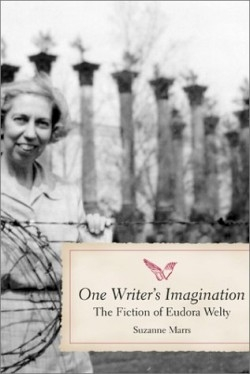One Writer's Imagination
The Fiction of Eudora Welty
When Eudora Welty died last year, American letters lost one of its greatest treasures. Welty has long attracted the attention of critics and scholars, but Marrs has authored the first full-length study to appear after her death, providing a wonderful introduction to Welty’s fictional canon.
Marrs, who is professor of English at Millsaps College in Jackson, Mississippi and has served as Welty Scholar at the Mississippi Department of Archives and History, examines all of Welty’s published books of fiction in chronological order and devotes a chapter to each. In general, she attempts to place the works in historical and biographical perspective. In this era of ideological criticism, Welty has sometimes been chided for not being more overtly political in her works, too often avoiding the complexities of the contemporary South in which she lived by setting many of her works in an idealized past or a fairy-tale form. Marrs attempts to demonstrate how Welty’s works do emerge fromÃ’and comment uponÃ’the era in which they were written.
At times, Marrs is quite convincing in her interpretations, such as her reading of Delta Wedding as a text that confronts the “challenges posed by World War II” with an “affirmation of faith” that prefigures William Faulkner’s Nobel Prize speech call for literature that will “help man endure by lifting his heart.” At other times, however, such as her reading of The Robber Bridegroom as a response to the growth of fascism in Europe, Marrs stretches her argument thin.
Marrs draws freely upon Welty’s biography and her manuscripts. As a personal friend of Welty in her final years and as an archivist for the writer’s papers, Marrs had access to information and conversations from which no other scholar could draw. She provides previously unknown details about Welty’s relationship with her family, and with her long-time friend John Robinson. It is Marrs’ work with Welty’s manuscripts, however, that will make this book most valuable. Drawing upon the manuscripts of Delta Wedding and Losing Battles, Marrs offers invaluable insights into Welty’s composition process, and hence her creative imagination.
As in her two previous books on Welty, Marrs’s prose is always clear and easy to follow, as is befitting a study of Welty, whose own prose was always a model of clarity. One Writer’s Imagination earns its place on the essential shelf of southern literary scholarship.
Reviewed by
Erik Bledsoe
Disclosure: This article is not an endorsement, but a review. The publisher of this book provided free copies of the book to have their book reviewed by a professional reviewer. No fee was paid by the publisher for this review. Foreword Reviews only recommends books that we love. Foreword Magazine, Inc. is disclosing this in accordance with the Federal Trade Commission’s 16 CFR, Part 255.

